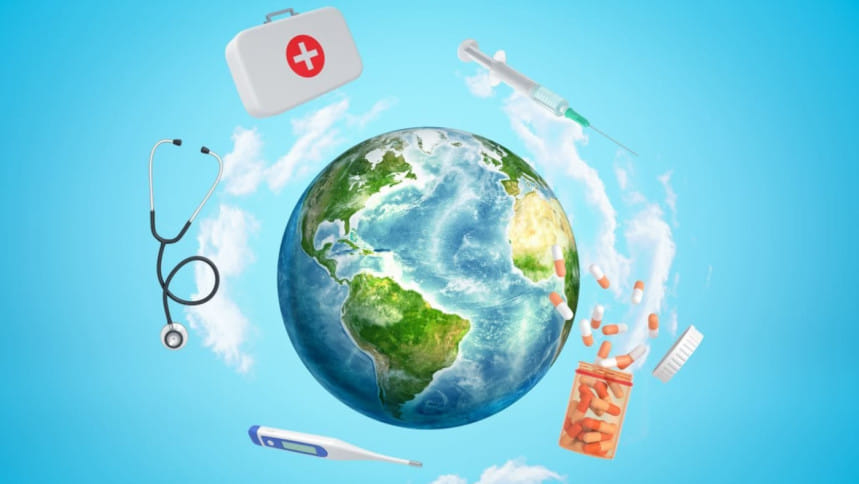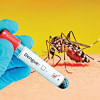When climate change becomes your doctor’s problem too

Climate change used to be that thing your cousin from abroad mentioned while nibbling gluten-free brownies. Now? It's here. It's in your armpits, your nosebleeds, your prescriptions, your health records, and your mum's dizzy spells. And it's barging into our hospitals—uninvited, unfiltered and, naturally, unfunded.
Dhaka has just endured one of the worst heatwaves in recorded history. Except we didn't really endure it; we sweated, we wheezed, we staggered around like dazed kebabs in an open tandoor. The government, ever efficient, issued guidelines, "Stay indoors," as if we all had the luxury of lounging in centrally air-conditioned drawing rooms, sipping electrolyte water and waiting for foreign remittance. Most of us were marinating in rooftop heat, trapped in tin sheds, or passing out on public buses that felt like mobile saunas with steering wheels.
Let's talk healthcare, that miraculous thing we keep expecting to work despite treating it like the last kid picked in a game of cricket. During the heatwave, hospitals were flooded with patients with heatstroke, dehydration, asthma, and rashes—the full buffet of climate-induced ailments. Doctors were trying to resuscitate fainting grandmothers while wiping sweat off their own brows. And all this in buildings that haven't been renovated since the British Raj, with ceiling fans that sound like dying goats, and ventilation systems that give up by noon.
Meanwhile, dengue has returned with the punctuality of a Shakib Khan film on Eid. Mosquitoes are thriving in places they never used to—hello, climate change—and bringing the gift of viral fever to all. In 2023, over 1,700 people lost their lives suffering from dengue, not because they didn't use mosquito nets, but because our health system failed to contain the disease.
Coastal areas are now grappling with rising salinity, which is causing high blood pressure, kidney disease, and complicated pregnancies among the locals. In Satkhira, women are developing urinary tract infections (UTIs) simply because the water they're using consists of elements that are unsafe for their hygiene. But sure, let's keep pretending climate change is just about "weather" and not the fact that it's literally pickling people.
Rural clinics, meanwhile, are collapsing under climate-linked disasters. Cyclones destroy infrastructure. Floods cut off access. There's one community clinic in a char area with no electricity, no medicine and no doctor. Still, climate change is treated like a side hustle in our health planning. Most district health strategies don't mention it. No one's training doctors to identify or respond to climate-related illnesses. There's no fund going into climate-proofing hospitals. And the best we've got are donor-funded pilot projects that disappear faster than ORS sachets in a paediatric ward.
But wait, there's more: the healthcare system is not just the victim. It's part of the problem too. Hospitals running on diesel generators, air conditioners from the '90s, and supply chains that emit enough carbon to make a Thanos snap look gentle. Medical waste—needles, bandages, expired medicines—ends up in rivers, lakes, and, if you're lucky, your nearest beel.
Now let's talk mental health—or the lack of it. Eco-anxiety isn't just some Western indulgence. It's what happens when Bangladeshi youth are told to study hard and dream big, only to see their future swallowed by floodwater or smog. One day it's their exam results, the next day it's their school collapsing in a landslide. How are they supposed to function when climate-induced trauma is now a graduation requirement?
And let's not forget the healthcare workers. Expected to be Florence Nightingale, Bear Grylls and Dr House all rolled into one, while working 12-hour shifts in unbearable heat without PPE, training or even a working fridge to keep insulin cool. When a system burns out its staff as quickly as its diesel, you know the emergency isn't coming—it's already here.
The solution? No, it's not more awareness campaigns with "climate-smart" slogans and forced group photos. It's hard cash and hard reform. It means redesigning hospitals to withstand floods and heatwaves. It means training healthcare workers on climate-linked illnesses. It means integrating climate data into epidemic forecasting. It means treating climate not as a buzzword, but as the underlying diagnosis behind half our public health crises.
Climate change is no longer creeping in—it's taking your blood pressure, biting your ankles, and casually suggesting an ICU admission. And if we don't act now, your next trip to the hospital won't be for treatment. It'll be for shelter.
So yes, climate change is your doctor's problem now. And if our leaders don't start treating it like one, they'll soon need a different kind of prescription: one for a collective collapse.
Barrister Noshin Nawal is a columnist for The Daily Star. She can be reached at [email protected].
Views expressed in this article are the author's own.
Follow The Daily Star Opinion on Facebook for the latest opinions, commentaries and analyses by experts and professionals. To contribute your article or letter to The Daily Star Opinion, see our guidelines for submission.

 For all latest news, follow The Daily Star's Google News channel.
For all latest news, follow The Daily Star's Google News channel. 










Comments